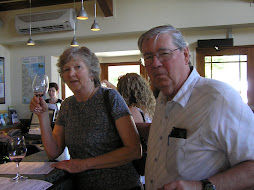



On Tuesday Clara and I took a tour of the Acoma Pueblo, located some
70 or so miles west of Albuquerque, high atop a mesa rising some 375
feet above the surrounding lands. The Puebloans, as they prefer to
be called, settled here around 1650 A.D., a date established by
Western archaeologists and anthropologists since the Puebloans had no
calendar or year system of their own, hence no way of saying how many
years ago they settled here.
Our tour guide was an earnest young man from the Pueblo (see first picture) who told us some about his people's religion. Their "migration stories" taught them that all living creatures emerged from the deep at an unknown
place variously known as "shepapu" or "shepau."
Their sacred home on the mesa was known as "Haaku' " and was "a place
prepared for them." Their ancestors had been told to search for
"Haaku'," and that they would know when they had found it when their
shouts of "Haaku' " were answered with an echo. (Looking around this
area and seeing the other mesas and hills in the area, it is apparent
that there would be echoes of shouts from the top of their mesa. (See second picture))
The pueblo was almost completely uninhabited today, since there were no utilities nor other amenities of today, but it is quite picturesque (see third picture.) I could not resist this fourth picture which, to me, shows the irony of a sleek modern auto in front of an ancient dwelling.
My question, which you can readily anticipate, is how it could be
that these people could have a similar creation story and a similar
"chosen people" myth as the Israelites and perhaps other Eastern
peoples. After all, they were quite separate in time and location
and could not conceivably had any communication . . .
While on that tour, I also ventured to ask a question of our tour
guide regarding his people's reaction to the priests (and soldiers)
bringing to them the Catholic religion. I said, approximately,
"Several years ago, I had a conversation with a young woman from
another pueblo who told me that her people did what the priests told
them, performed the rituals as instructed, etc., but in their hearts
they kept only their traditional beliefs. Was that also true of your
people?"
The young man's answer was quite interesting, but also puzzling to
me. He said that his people perceived that their religion and the
religion of the priests were really the same religion, differing only
in being expressed within the framework of two different cultures.
He went on to say that this was basically true of all religions.
Were these Puebloans truly the first Universalists? Could they
really have believed/perceived that the two religions were, in basic
terms, the same religion with only a different cultural realization?
Or is this just the first manifestation of "spirituality without
religion"?

No comments:
Post a Comment